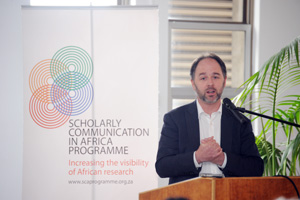UCT sets the scene for Berlin10 Conference
05 September 2012 | Story by Newsroom Access activist: Cameron Neylon, advocacy director for the Public Library of Science, at a UCT seminar on scholarly communication spoke in favour of more Afropolitan methodologies to assess the impact of research on development.
Access activist: Cameron Neylon, advocacy director for the Public Library of Science, at a UCT seminar on scholarly communication spoke in favour of more Afropolitan methodologies to assess the impact of research on development.
Global experts on open access and knowledge-sharing recently shared their views on the developments and trends in this rapidly evolving area at a UCT seminar hosted by the Scholarly Communication in Africa Programme (SCAP).
SCAP is a four-country initiative hosted at UCT in partnership with the Universities of Botswana, Mauritius and Namibia, aimed at increasing the visibility of African research. Its Open Access Strategies for African Institutions seminar was a precursor to the upcoming Berlin10 Open Access Conference - named after The Berlin Declaration on Open Access to Knowledge in the Sciences and Humanities of 2003 - to be held in Stellenbosch in November this year.
Leslie Chan of the University of Toronto Scarborough; Cameron Neylon, advocacy director for the Public Library of Science (PLOS); and Alma Swan, a consultant in the field of scholarly communication, were hosted by SCAP for a two-day advisory board meeting and workshop, which preceded the seminar.
UCT Vice-Chancellor Dr Max Price, in opening the seminar, remarked that the global developments around scholarly communication are "the most profound of the various revolutions having an impact on universities".
Chan in his presentation at the seminar laid bare the global power dynamics around the flow of knowledge. Neylon explored alternative ways of assessing the impact of research. And Swan reported on economic evidence for the benefits of the Open Access approach at national level, sketching the link with innovation and engagement with non-academic audiences.
For more information on the Berlin10 conference, titled Networked Scholarship in a Networked World: Participation in Open Access, visit Berlin10 website.
 This work is licensed under a Creative Commons Attribution-NoDerivatives 4.0 International License.
This work is licensed under a Creative Commons Attribution-NoDerivatives 4.0 International License.
Please view the republishing articles page for more information.










